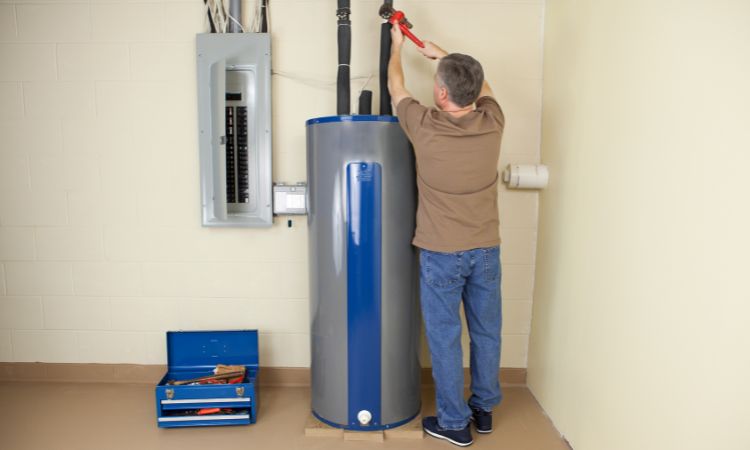Handling Regular Heater Malfunctions
Handling Regular Heater Malfunctions
Blog Article
How do you really feel on the subject of Common Problems with Tank Water Heaters?

Picture beginning your day without your routine warm shower. That currently sets an inadequate tone for the rest of your day.
Every house requires a reliable hot water heater, yet only a few understand just how to take care of one. One easy way to maintain your hot water heater in top shape is to check for faults consistently and also repair them as quickly as they show up.
Remember to turn off your water heater prior to sniffing around for faults. These are the hot water heater mistakes you are more than likely to run into.
Water also warm or as well cold
Every water heater has a thermostat that determines how hot the water obtains. If the water entering into your home is too warm regardless of setting a convenient optimum temperature level, your thermostat might be faulty.
On the other hand, also cold water may be due to a fallen short thermostat, a damaged circuit, or improper gas circulation. For instance, if you make use of a gas water heater with a busted pilot light, you would certainly get cold water, even if the thermostat remains in ideal problem. For electric heating systems, a blown fuse might be the wrongdoer.
Not nearly enough warm water
Water heaters can be found in numerous dimensions, depending on your hot water needs. If you lack warm water before everybody has actually had a bathroom, your hot water heater is too little for your family size. You must take into consideration installing a larger water heater container or choosing a tankless water heater, which occupies much less room and is much more resilient.
Unusual noises
There are at least five sort of sounds you can speak with a hot water heater, however the most common interpretation is that it's time for the water heater to retire.
First of all, you need to know with the typical sounds a water heater makes. An electric heater might seem different from a gas-powered one.
Standing out or banging noises typically mean there is a piece of sediment in your containers, as well as it's time to clean it out. On the other hand, whistling or hissing audios might just be your shutoffs letting some stress off.
Water leaks
Leakages might come from pipelines, water connections, shutoffs, or in the worst-case scenario, the storage tank itself. Over time, water will certainly corrode the container, and discover its escape. If this happens, you require to change your water heater immediately.
Nonetheless, before your modification your entire container, make sure that all pipelines remain in place and that each shutoff functions flawlessly. If you still need help determining a leakage, call your plumber.
Rust-colored water
Rust-colored water suggests among your water heater components is rusted. Maybe the anode pole, or the container itself. Your plumber will certainly have the ability to recognize which it is.
Warm water
Despite just how high you established the thermostat, you will not obtain any kind of warm water out of a heating system well past its prime. A hot water heater's effectiveness may decrease with time.
You will additionally obtain lukewarm water if your pipes have a cross connection. This means that when you switch on a faucet, hot water from the heating unit moves in alongside routine, cold water. A cross connection is easy to place. If your warm water faucets still run after closing the water heater shutoffs, you have a cross link.
Discoloured Water
Rust is a significant reason for unclean or discoloured water. Rust within the water tank or a stopping working anode rod can cause this discolouration. The anode pole protects the storage tank from rusting on the inside as well as need to be inspected annual. Without a rod or an appropriately functioning anode rod, the warm water quickly rusts inside the tank. Get in touch with an expert hot water heater specialist to figure out if changing the anode pole will repair the issue; otherwise, change your hot water heater.
Conclusion
Ideally, your water heater can last ten years before you need a modification. Nevertheless, after the 10-year mark, you might experience any one of these mistakes a lot more consistently. At this moment, you ought to add a new water heater to your spending plan.
How To Troubleshoot 3 Common Water Heater Problems in Twin Cities
The Water Heater Is Leaking
A leaky cold water inlet valve A loose pipe fitting A leaky temperature and pressure relief valve A corroded anode rod A cracked tank Turn Off Your Water Heater:
Shut off your gas water heater by turning the gas valve on the unit to the “OFF” position. Shut off your electric water by switching its power off at your electrical panel. Look for a two-pole breaker labeled “water heater” and turn it to the “OFF” position. Move the ball valve connected to the water heater to be perpendicular to the piping at a 90° angle. Look for the Leak:
Depending on whether the water is coming from the tank's top or bottom, you’ll want to look for the leak in different locations.
If the leak comes from the top of the tank, carefully look for water escaping from the cold water inlet valve or loose pipe fittings. Rusted hot and cold water valves can have loose connections with the tank, with water leaking out of them.
https://mspplumbingheatingair.com/blog/how-to-troubleshoot-3-common-water-heater-problems
We were shown that editorial about Common Problems with Tank Water Heaters from an associate on our other site. So long as you enjoyed our article kindly do not forget to share it. Thank you for your time invested reading it.
Clogged drain? Phone! Report this page